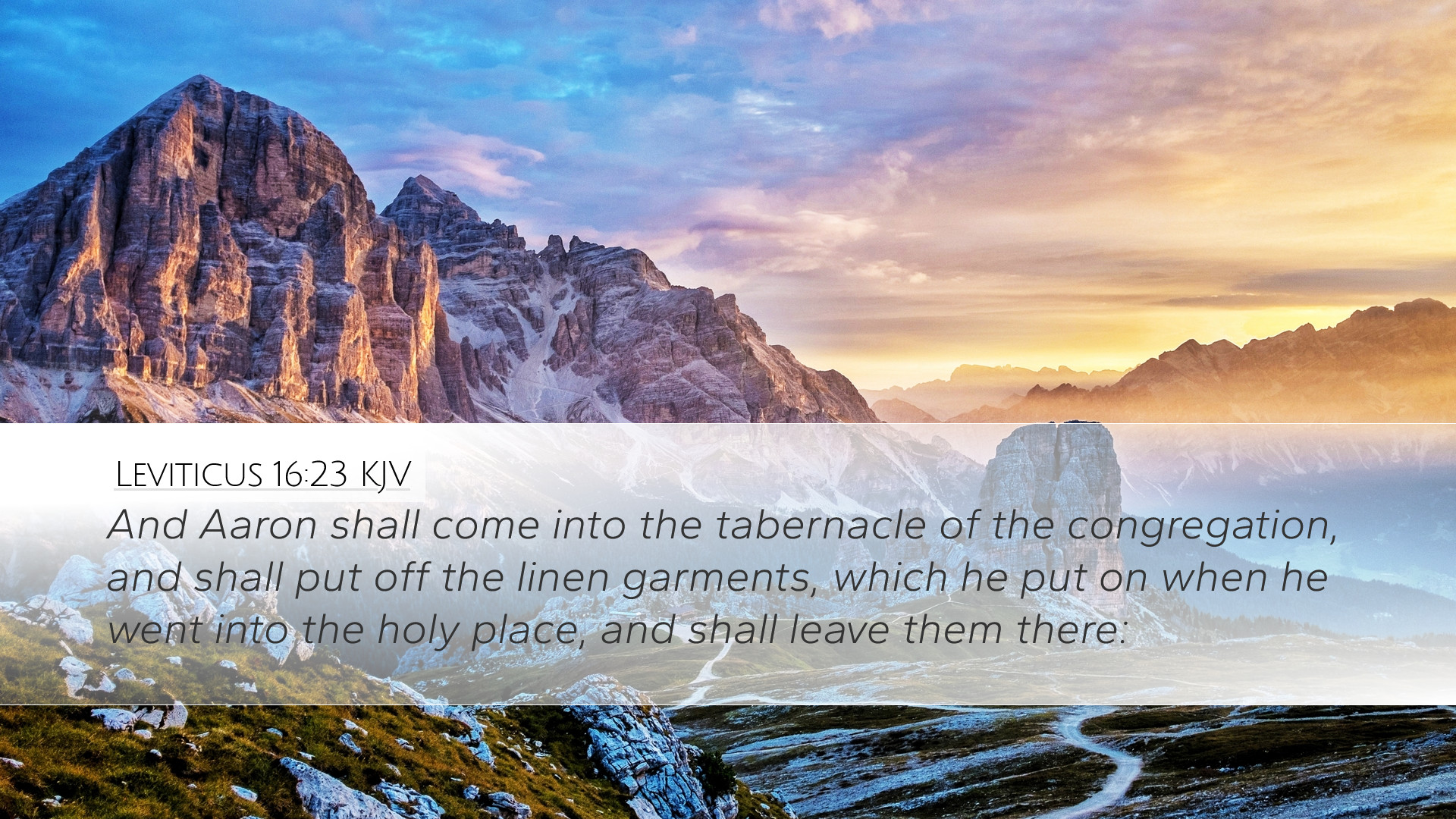Commentary on Leviticus 16:23
Verse: "And Aaron shall come into the tabernacle of the congregation, and shall put off the linen garments which he put on when he went into the holy place, and shall leave them there."
Introduction
The practice of Aaron changing from his linen garments upon exiting the holy place underscores the profound respect and holiness associated with the rituals of Yom Kippur, the Day of Atonement. This verse highlights significant theological and practical implications for understanding the nature of holiness, atonement, and the Levitical priesthood.
The Nature of Aaron's Garments
According to Matthew Henry, the linen garments represent purity and simplicity. The choice of linen, a fabric known for its refinement, signifies the separation of the sacred from the secular. Henry notes that the garments were "for glory and for beauty," indicating their role in portraying the holiness required when approaching God.
Albert Barnes expands this interpretation, affirming that the high priest's attire not only reflected his status but also served to remind the Israelites of their own need for purity in worship. The removal of these garments suggests an acknowledgment of the transition from the sacred back into the daily life of the people.
The Ritual of Removal
As pointed out by Adam Clarke, the act of Aaron removing his linen garments after performing the high priestly duties serves as a profound symbol of atonement. Clarke states that this process is reflective of the high priest returning from the presence of God, indicating the completion of sacrifices made on behalf of the people.
- Significance of Transition: Clarke emphasizes that the removal signifies a transition from the holy back to the common, reinforcing the idea of reverence in the presence of the divine.
- Cleansing and Restitution: The high priest's actions suggest a necessary humility; even the priest must acknowledge the need for continual cleansing and atonement.
Theological Implications
This act has profound implications for understanding the work of Christ as the ultimate High Priest. Just as Aaron is required to change garments, Christ completed His sacrificial work and ascended into the heavenly sanctuary (Hebrews 9:11-12). This reflects the transition from the old covenant practices to the new covenant in Christ, as pointed out by Henry.
Connection to New Testament Themes
Barnes reflects on how this verse foreshadows the ultimate sacrifice of Jesus, who left his earthly ministry having fulfilled the law and established a new covenant through His blood. The removal of the high priest’s garments can serve as a metaphorical foreshadowing of Jesus' resurrection and ascension as He left the earthly realm for the heavenly.
Practical Applications for Today
For contemporary pastors and theologians, this passage serves as a reminder of the holiness required in both personal and corporate worship. The emphasis on the transition from sacred duties back to daily life can encourage believers to maintain holiness in all aspects of life.
- Encouraging Humility: The acknowledgment of needing to "put off" the garments implies a constant need for self-examination and humility in service.
- Holiness in Worship: Pastors are reminded to guide their congregations in understanding the profound nature of approaching God, and maintaining an attitude of reverence.
- Connection to Community: Just as Aaron acted on behalf of the people, this encourages church leaders to acknowledge their role in leading collective worship and intercession.
Conclusion
Leviticus 16:23 serves as a poignant reminder of the high calling of spiritual leaders and the importance of holiness in worship. The insights drawn from the commentaries of Henry, Barnes, and Clarke underscore the continuous need for reverence and purity in the pursuit of God. As we reflect on Aaron’s actions, may we be inspired to seek holiness actively in our worship and in our lives, creating spaces for authentic encounters with the divine.


